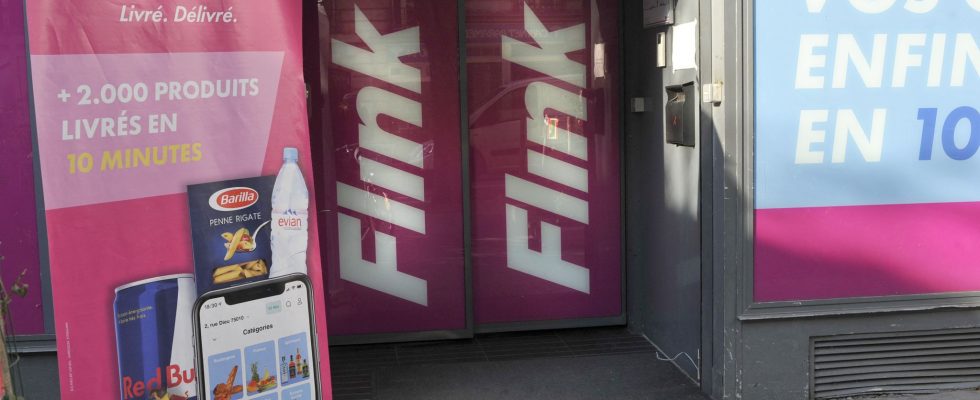For seven months, town halls have been waiting for this verdict. On Friday March 24, the government ruled in favor of elected officials in a decree and an order published in the Official Journal: “dark stores” are warehouses and not shops, paving the way for the regulation of this activity by town halls. These premises where products are stored that are delivered in a few minutes after being ordered on the Internet may therefore now be forced to close if the local urban plan (PLU) prohibits this type of activity at their address.
It is a victory for the municipalities, especially since a decision of the Council of State, taken the day before, goes in the same direction. “With Olivier Klein (Minister Delegate for the City and Housing), we had undertaken that the town halls would have the possibility of approving or not the establishment of ‘dark stores’ in their municipality. It is now done. “, welcomed Friday on Twitter Olivia Grégoire, Minister Delegate for Trade.
The “quick commerce”, which has emerged thanks to the confinements and the Covid-19 epidemic since 2020, offers in a few minutes the delivery of everyday products, similar to those for sale in a convenience store. “In France, ‘quick commerce’ weighed 150 million euros in turnover in 2021. We should end the year 2022 around 300 million euros. It will double each year, and the slowdown in the pandemic does not slow down activity, because all layers of consumers have not yet been penetrated”, analyzed for L’Express Emmanuelle Peltier, director at IRI, an American economic intelligence company. In France, the activity of this sector is equivalent to that of a single large hypermarket, according to the specialized media Linear.
But it is criticized by many elected officials around the world who denounce pell-mell the arrival of “warehouse cities”, nuisances for local residents, even the development of the “lazy economy”. “The ‘dark stores’ are unbearable: they create nuisance, compete with small downtown businesses, while Paris loses 4 to 5% of its population every year. We have to find a solution to eradicate the phenomenon”, explained in August to L’Express the deputy of Paris and vice-president of the Renaissance group, Sylvain Maillard. Town halls have gone on the offensive, demanding that they be closed. And the government paved the way for them.
“A satisfying answer”
“The ‘warehouse’ sub-destination covers constructions intended for the logistics, storage or warehousing of goods without a sales area, permanent points of delivery or delivery and collection of retail purchases ordered electronically , as well as the premises hosting the data centers”, can we read in the decree published in the Official Journal (OJ). This provision will come into force on July 1, 2023. The Urban France association, representing large cities and metropolises, also considered that it was a “satisfactory response to the legitimate concerns of urban elected officials”, even if it “does not solve the problems posed by new consumer practices, the digitization of purchases, disintermediation and new storage and delivery systems for goods in the city.”
In Paris, the protest is lively among the inhabitants pointing to the noise and traffic nuisances generated by the incessant ballet of delivery men, at the foot of apartment buildings, explains the Parisian Urban Planning Workshop (Apur), an association created by the Council of Paris, in a February 2022 study. In January 2022, Apur identified 60 “dark stores” in Paris, “at least 30 dark kitchens” (kitchens where meals are prepared and then delivered to homes) and 207 pedestrian drive-thru in January 2022. The association notes an unequal distribution in the territory, with the right bank more densely covered. “Among the 60 ‘dark stores’ in Paris, 14 are located on a section of road protected under the protection of trade and crafts,” adds Apur. The decree was therefore awaited firmly at the town hall of Paris.
“We will finally be able to sanction and ban these ghost warehouses”, rejoiced with AFP Emmanuel Grégoire, the assistant to the town planning of the mayor PS Anne Hidalgo. The latter had, on August 13, sounded the alarm by posting on his Twitter account a draft decree of the Directorate of Housing, Urban Planning and Landscapes (DHUP) – dependent on the Ministry of Ecological Transition – allowing these “dark stores” to acquire trade status in the event of the opening of a collection point.
The government was to issue a decree at the end of 2022 to put an end to the legal vagueness concerning these spaces, but the publication of the text was delayed. In question: precautions aimed at differentiating them from pedestrian drives, the withdrawal points of the large distribution of orders made online. Thursday, the town hall of Paris had won a first victory before the Council of State, in the dispute which opposed it to two fast delivery companies, Frichti and Gorillas. The highest administrative court agreed with him, finding that the “dark stores” operated by these two companies were indeed warehouses within the meaning of the urban planning code and the Parisian local urban plan (PLU) of which the capital has the mastery.
